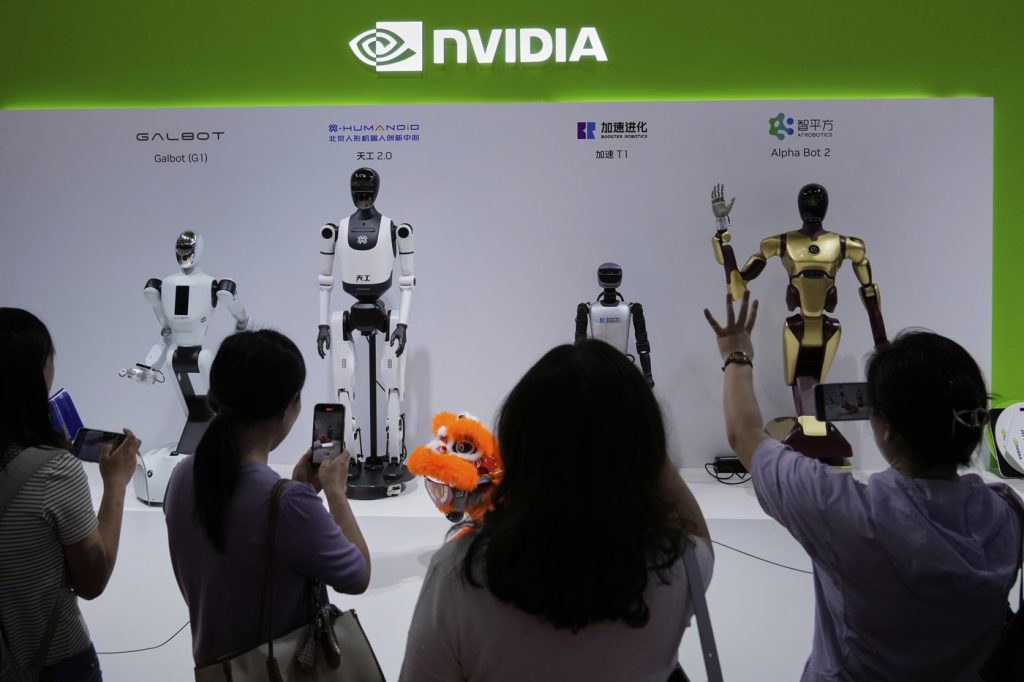SAN FRANCISCO (AP) — Nvidia, a key player in the artificial intelligence (AI) sector, is set to release its quarterly financial report, which is anticipated to shed light on whether the current stock market rally is driven by genuine technological advancements or merely an overhyped bubble. The results, scheduled to be announced on Wednesday afternoon, have become a critical indicator of the AI market's health, as Nvidia produces the majority of the chips that power the technology essential for extensive data centers involved in the AI boom.
Last month, Nvidia made headlines by becoming the first publicly traded company to exceed a market valuation of $4 trillion. Since achieving this milestone, Nvidia's stock price has surged by an additional 13%, resulting in a substantial increase of $500 billion in shareholder value. This remarkable rise follows a dramatic turnaround since early 2023, when Nvidia's market cap was around $400 billion. This surge was fueled significantly by the release of OpenAI’s ChatGPT chatbot in late 2022, which ignited an unprecedented enthusiasm for AI technology reminiscent of the excitement surrounding the launch of the first iPhone in 2007.
The tech sector has reaped significant rewards from the AI frenzy, contributing to the overall positive performance of the stock market. The benchmark S&P 500 index has gained 68% since the end of 2022, largely driven by optimism surrounding AI developments. However, despite the prevailing euphoria, concerns have emerged regarding the sustainability of the AI market's growth, prompting comparisons to the late 1990s dot-com boom that culminated in a severe market crash in 2000. This downturn not only destabilized the stock market but also plunged the U.S. economy into a prolonged recession, impacting Silicon Valley for years.
Recent commentary, including a report from MIT indicating that 95% of AI pilot projects fail, has raised alarm bells among investors. OpenAI's CEO Sam Altman also suggested that the AI market may be in a bubble, adding to the growing unease. Furthermore, some tech stocks show signs of being overvalued; for instance, Nvidia trades at approximately 40 times its projected earnings, double the traditional valuation threshold. Microsoft, another AI leader, has a market value just below $4 trillion, while companies like Amazon, Facebook parent Meta Platforms, and Alphabet, Google's parent company, range between $1.9 trillion and $2.5 trillion in value.
Analysts project that Nvidia will report another quarter of impressive growth for the May-July fiscal period, with expectations set at earnings of $1.01 per share—up 49% year-over-year. Revenue is forecasted to rise 53% from the previous year, reaching around $46 billion. This growth reflects substantial investments from major players such as Microsoft, Amazon, Alphabet, and Meta, who are collectively allocating over $325 billion towards AI infrastructure in 2023. Nvidia stands to benefit significantly from this surge in demand due to its dominant position in the AI chip market.
However, Nvidia's growth trajectory is showing signs of slowing down. If the analyst predictions are accurate, Nvidia's revenue growth for the latest quarter will fall short of the 122% increase reported during the same period last year. Compounding these challenges, Nvidia has faced setbacks due to trade restrictions arising from the trade war initiated by former President Donald Trump, specifically a ban on AI chip sales in China. This ban has already led to a $4.5 billion impact on Nvidia's finances during its fiscal first quarter, with estimates suggesting a potential loss of approximately $8 billion in sales for the most recent quarter.
Recently, Trump eased restrictions on Nvidia’s sales in China, allowing the company to operate under a compromise that involves a 15% cut of the company's revenues from the Chinese market. This development is expected to be a focal point in CEO Jensen Huang's upcoming conversation with analysts, where he will also discuss the current state of the AI market.











